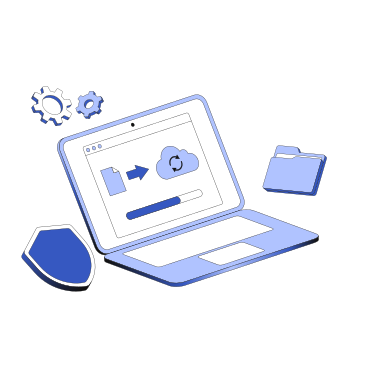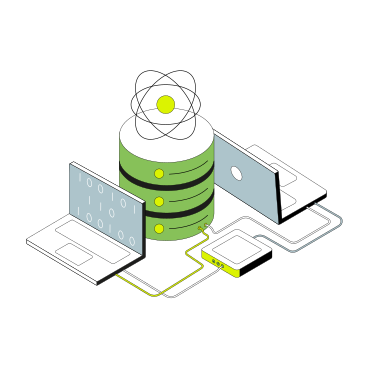In This Article
Our lives are becoming increasingly digital as everything is stored digitally. From irreplaceable photos and videos to critical work documents, the data we store on our computers and mobile devices is priceless. But what happens if your device crashes, files get infected with malware, or the device gets stolen?
It’s crucial to prioritize the security of your digital life. Effective data backup strategies ensure your valuable data remains protected and accessible, even during unforeseen disasters.
In this blog post, we’ll explore the different data backup strategies, from local storage to the convenience of cloud storage, and the tools available to secure your digital life through comprehensive data backup solutions. Don’t let a cybersecurity threat or hardware failure put your precious data at risk – stay one step ahead with these essential strategies to safeguard your digital world.
Why Is It Important to Backup Your Data

In our ever-expanding digital world, which is filled with irreplaceable personal memories and professional files, the overall value of our data is increasing with every passing day. This includes cherished memories captured in the form of photos and videos, password databases, important documents like legal contracts, and ongoing projects.
Now, imagine how you would feel if you lost access to all of that data within a blink of an eye. The cause of data loss could be a mere virus attack or hardware failure due to an electrical surge.
Did you know the most common data loss is due to hardware failure? It causes a monetary loss of around $12 billion annually in the United States alone. ExpressVPN recently conducted a survey on people’s backup habits across the U.S., German, UK, and French markets and revealed that 38% of the respondents have lost access to important files because they have not backed up their data.
Data loss is a risk we all could face, but there’s good news: it’s preventable! Backing up your data is like an insurance policy for your digital life. As the saying goes, it’s always better to be safe than sorry.
Let’s explore the possible threats many are unaware of and how backing up data can bring peace of mind.
- Disasters and Tragedies Can Happen: There could be multiple reasons, such as hardware and software failures, natural disasters that can strike anytime, or, worst-case scenario, your device getting stolen.
- Human Errors: We have all done this. One wrong click of a button can accidentally delete documents or files.
- Rising Security Threats: Malware and ransomware attacks are becoming common. These attacks can encrypt and corrupt all your data, making it inaccessible. These attacks ask you for a costly ransom to decrypt your files, and in most cases, they don’t give you access even if you make the payment.
- Save Time and Money: Data recovery is time-consuming and expensive. Professionals charge a hefty amount for the procedure; even then, there is no assurance that your data will be fully recovered.
- Peace of Mind: Having your data securely backed up and stored correctly ensures peace of mind. You won’t need to worry about losing precious memories, important documents, and irreplaceable work and effort.
Now that you are aware of the true value of creating timely backups of your data, we will move on to the next section, where you will learn how to make a backup of your data safely.
Strategies to Safely Backup Your Data

This section will explore some of the best strategies for safely creating and storing your data backup and the key considerations for keeping your data protected and safe.
Best Solutions for Data Backup
Multiple data backup and storage solutions are available depending on availability, requirements, and budget. Each option has strengths and weaknesses. Let’s explore some of them.
- Local Storage: This is a well-known solution for creating data backups away from your main computer or device. Depending on your requirements and affordability, you will need an external hard disk or USB flash drive. Although these are easier to store and organize, physical damage or theft can be a concern, so you will also need a locker.
- Cloud Storage: Solutions like Google Drive, OneDrive, Backblaze, and Dropbox are available in various price brackets and with various encryption standards and security measures. Some even provide automated backup uploading and downloading. It is recommended that features like two-factor authentication and encryption be looked for. Be sure to choose a reputable provider with strong security practices and multiple server locations.
- NAS (Network-Attached Storage): A NAS device works as a dedicated storage server linked to your local network, offering a centralized location to create and manage all of your backups for all your devices. It is easy to scale but a bit on the expensive side. The setup and maintenance require technical know-how about networking. You must also ensure the NAS device stays safe from natural disasters and electrical fluctuations.
- Hybrid Solution (Mix of Local & Cloud Backup): If you want to be safe and maximize the protection and availability of your backups, you can consider a mix of local and cloud storage. Local backups offer faster recovery access, while cloud storage provides a safe offsite location in case your local storage device fails.
- Multi-Cloud Backup Strategy: If you rely heavily on cloud storage backups and have found some trustworthy solutions, you can consider using multiple cloud storage providers. This will store your backup data on multiple servers around the world. This ensures you have 24/7 access to your data while knowing it is protected in case of an outage or service disruption with one of the providers.
Ways to Setup and Create Your Backups
There are multiple possibilities and systems you can follow to setup and create your data backups to ensure your whole system is well-optimized for your requirements, let’s explore three well-known options:
- Automated and Scheduled Backup: The backups can be set up to be automatically made according to your schedule, i.e., hourly, daily, or weekly. First, determine how often you need to back up your data. This depends on how frequently your data changes. All the files will be backed up based on this schedule.
- Granular Backup: This backup system optimizes storage space and backup speed. We know not all data have the same backup priority. You need to identify critical data that requires frequent backups (daily/hourly) and less crucial data that can be backed up less often (weekly/monthly).
- The 3-2-1 Rule: This is also known as a bulletproof backup strategy. It emphasizes having at least three copies of your data, two stored on different local storage and one stored offsite. This protects against data loss from device failure, accidental deletion, and even physical disasters. You can further customize this system to suit your needs.
Helpful Tips to Ensure Your Backup is Secure

Securing your data backups is just as important as creating them. This means ensuring unauthorized users can’t access your information, even if they get their hands on the backup. Encryption is the only way to achieve this, which scrambles your data into an unreadable format. This way, even if someone intercepts your backup, they won’t be able to decipher it without the decryption key.
Here are some key steps you can take to ensure your backups are always secure and safe regardless of where and how you are planning to store them:
- Encrypting Your Backup: This is an important step and adds an extra layer of security to your backup. Encrypt your backups, especially those containing sensitive information. Encryption scrambles your data using a key, making it unreadable to anyone who doesn’t have the decryption key. A strong 256-bit AES encryption algorithm is recommended.
- Strong Passwords: We recommend using strong and unique passwords to access your backups, locally or in the cloud. Never reuse the same password across different accounts.
- Choose a Secure Storage Location: If you opt for local backups, you must choose a secure location for their storage, like a locked cabinet or a fireproof safe. This protects your data from any possible theft or damage.
- Multi-Factor Authentication (MFA): MFA adds an extra layer of security to passwords. It requires a second verification step, like a code from your phone or a fingerprint scan, to access sensitive data. There are several different types of MFA you can use. This significantly reduces the risk of unauthorized access even if a password is compromised.
- Find a Secure Cloud Storage Provider: If you plan to back up your data to cloud storage, we recommend you choose a provider with a strong security track record. Look for features like encryption, two-factor authentication, and regular security audits.
- Verifying Backups: Depending on the sensitivity of your data, it is suggested that you perform regular test restorations of your backups to check whether the backup system is functioning correctly and whether you can access your data when needed. Try restoring a small amount of data from your backup to confirm everything works as expected.
- Use Checksums to Verify the Integrity of Backup: You can utilize checksums, which are mathematical values that verify the integrity of your data. Compare the checksum of your backup with the original data to ensure no corruption or modification occurred during the backup process.
- Backup Monitoring: You can use add-ons and tools to set up and automate alerts or notifications for backup failures and all the backup logs. This ensures you’re promptly notified of any issues and can take action to fix them before data loss occurs.
Concluding Thoughts
Protecting your digital life through effective data backup strategies is an investment in peace of mind and the security of your data. Whether you opt for cloud storage, NAS storage, external HDD storage, or a combination of any of the two, prioritizing regular backups and encryption protocols is essential in ensuring the safety and security of your irreplaceable data from cyberattacks.
By taking proactive steps to secure your digital assets, you can lessen the risk of data loss due to cyber threats or unexpected events. Start implementing these best data backup strategies today and protect your priceless data for years.











